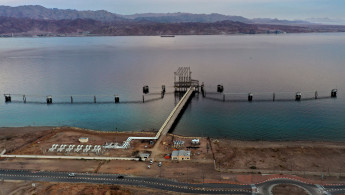UAE begins transporting oil to Europe via Israeli pipeline: report
The UAE has started transporting oil to Europe via an Israeli pipeline, according to media reports, months after the energy deal prompted Egyptian worries over a 'rival' to the Suez Canal for shipping fuel.
An Emirati vessel which arrived at the Port of Eilat in southern Israel last week was in fact an oil tanker, according to a report aired by Kan.
The Israeli public broadcaster showed images of the tanker hooked to the Eilat-Ashkelon pipeline, claiming that six tonnes of crude (6,000 liters) were fed through per hour.
In October, Israeli state-owned Europe-Asia Pipeline Company (EAPC) signed a memorandum of understanding with MED-RED Land Bridge, a company with both Israeli and Emirati owners, to transport oil through the pipeline.
It came amid a flurry of deals covering business and commercial sectors from banking to filmmaking, after the UAE and Israeli agreed to normalise ties.
The Eilat-Ashkelon pipeline, which links two Israeli ports on the Red and Mediterranean seas respectively, came under rocket attack by armed groups from Gaza during Israel's latest campaign on the besieged territory.
Meanwhile, Israeli officials remain opposed to the passage of large quantities of Emirati oil through the pipeline due to environmental concerns over potential oil spills.
According to the Kan report, neither the office of Israeli Prime Minister Benjamin Netanyahu nor Israeli National Security Adviser Meir Ben-Shabbat communicated details of the deal to government departments.
Read also: Egyptian officials make conflicting statements over threat to Suez Canal from Israel-UAE pipeline
The development comes months after contradictory statements by the head of the Egyptian Suez Canal Authority (SCA) over the possible economic impact of the pipeline on one of Cairo's most important sources of revenue.
Osama Al-Rabei told Egyptian state TV that the project could in the long-term decrease traffic through the canal by as much as 16 percent but later backtracked. Anonymous Egyptian officials said Rabie had downplayed the danger in order not to upset relations between Cairo and Abu Dhabi.
The Trans-Israel pipeline
The pipeline, known as the Trans-Israel pipeline, has a chequered history. It is the product of a joint venture between Israel and Iran in 1968, when the then Shah of Iran enjoyed close relations with Israel.
After Egypt blocked the Suez, Israel allowed Iranian oil to be shipped from Ashkelon to Eilat, where it would be destined for European markets.
But when the Islamic Revolution erupted in 1979, Iran's use of the pipeline ended abruptly. Tehran took legal action over the pipeline and received $1.1 billion from Israel in compensation following a 2016 Swiss court order.
Meanwhile, EAPC expanded, handling oil from Russia and former Soviet states. Company operations were placed under a strict gagging order by a Knesset committee in 2017.
In 2014, the secretive pipeline was the site of a massive oil spill which impacted on a desert and nature reserve in Israel.





 Follow the Middle East's top stories in English at The New Arab on Google News
Follow the Middle East's top stories in English at The New Arab on Google News


